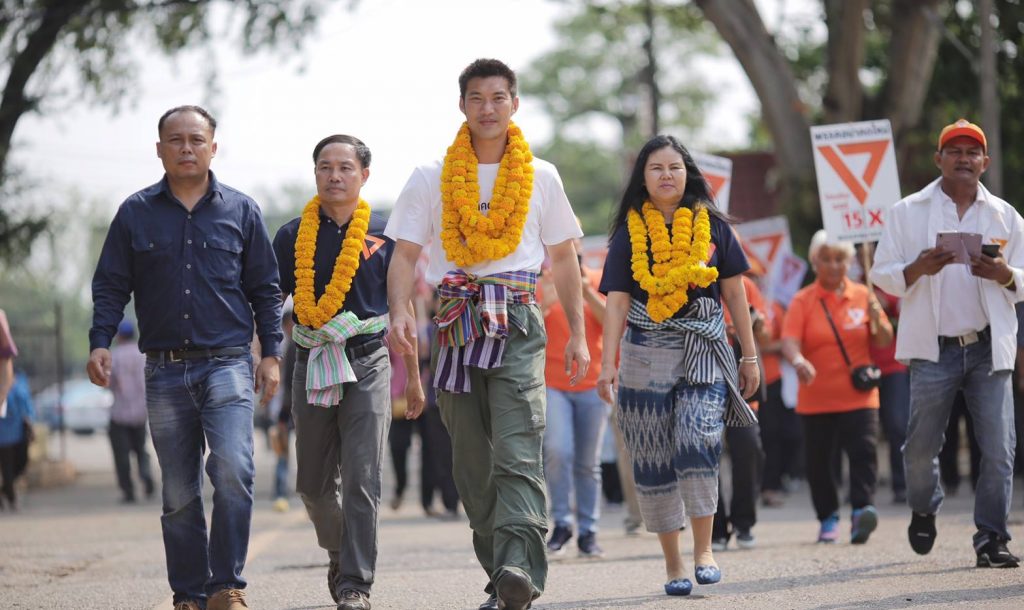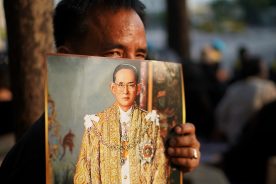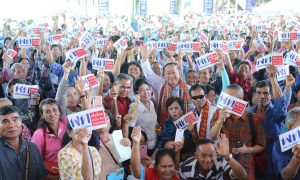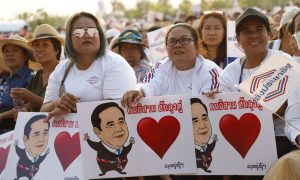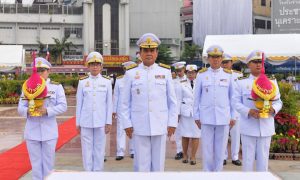At 10.45PM on 23 March this year—or just over 9 hours before polling booths opened in Thailand’s first general election in 8 years—the Royal Household Bureau released a televised announcement. In it, His Majesty the King assigned the Lord Chamberlain with invoking words imparted by the late King Bhumibol Adulyadej in 1969, or half a century ago. The message of “supporting good people so they can govern the country” is now one that Thai people are intimately familiar with.
The words, continually iterated by state officials since the political crisis of May 1992, were invoked once again, this time with emphasis on the current King’s reign: “His Majesty desires for the people of the nation, all the way to government officials of every unit, both civil servants, soldiers and police … to reflect on and awaken to the statement imparted by the late King”. It is worth observing that that night, the hashtag #โตแล้วเลือกเองได้ (“we’re grown up already and can choose for ourselves”) quickly rose to the number one trending topic on Twitter.
Who voters conceive as “good people” became progressively clearer from the preliminary election results tallied the next day—which showed, rather, that there is no agreement. Voters who selected NCPO leader General Prayut Chan-ocha as “a good person to govern the country” in the capacity as the next prime minister numbered 8.32 million people. Meanwhile, voters who rejected General Prayuth as “a good person to govern the country” numbered 15.49 million. Small- to middle-size parties which had declined to present a clear stance on the continuation of Prayut’s leadership, such as Bhumjaithai, the Democrats and Chartthaipattana, received a combined 7.94 million votes. All this matters whether or not the legislature (sitting with the 250-person senate) ultimately selects Prayut as Thailand’s next prime minister.
Note: These are preliminary figures based on the counting of approximately 94% of ballots, which have been organised according to the announcement on 27 March of a formation of a coalition of parties opposed to Prayut. BBC Thai calculates, “The 6 parties who announced unequivocally today that they are in an alliance collectively received 14.99 votes. If the New Economics Party is to join, this number rises to 15.49 million votes. Meanwhile, parties who have announced their support for Prayut’s bid to be prime minister, such as Palang Pracharat and the Action Coalition for Thailand (but not including the People’s Reform Party which did not receive any seats in the legislature) are collectively supported by 8.32 million votes. Middle- to small-size parties who have yet to present a clear stance, that is Bhumjaithai, the Democrats and Chartthaipattana, received a collective 7.94 million votes”. The New Economics Party has since confirmed its entry into the anti-Prayut coalition.
How are we to make sense of this election and its results? I suggest contextualising the election in what I see as the Prayut–NCPO regime’s two major failures throughout its five years of rule: first, its failure to establish a stable order of power at the level of elites and second, its failure to induce political obedience from the people. Attention to both the shifting order of elite power and the Prayuth–NCPO regime’s relations of power with the people will assist us to holistically picture both the origins and future trajectory of the post-election government.
I begin by discussing the 2019 elections in the context of elite politics, through the framework of drama or spectacle. Rather than the effective performance of a “theatre state”, the election devolved into a “theatre of chaos”. What was intended to be a show of electoral competition, with the winner pre-determined in advance, instead inadvertently made visible the fragmentation of political elites.
I then examine the election and relations of power between the people and the Prayuth–NCPO regime. An important issue is that we are in the midst of a populist moment, which has manifested first and foremost in the successful electoral breakthrough of the Future Forward Party. I should be clear from the outset that I do not use the word “populism” in the pejorative, economic sense, referring to state spending that flouts fiscal discipline in the pursuit of pleasing the public. The populism I speak of is political populism, or the mobilisation of the populace at large. In the 2019 election, populist actors actualised a political opportunity structure which had been made possible by first, the withdrawal of two previous populist leaders from Thai politics and second, rising discontentment with the extant political order.
Finally, I turn to making predictions about post-election politics. I believe it is possible that voters awakened by forces of political populism will be beset by rising disappointment and disillusionment with the elite-dominated political order which was set in place prior to the elections to steer and constrain political change. Because the NCPO has not succeeded in the two major endeavours described above, even after five years in power, the elections devolved into a “theatre of chaos” at the level of elites and manifested a “populist moment” at the level of the people.
The theatre of chaos
I begin with the following question: who exactly is General Prayuth Chan-ocha, the prime ministerial candidate of the Palang Pracharat party?
One way of getting to the significance of that question is to ask another: is Prayut a state official or not? This question was the subject of debate during campaigning, since the answer affects his right to accept a prime ministerial nomination. The most direct and clear answer that I have encountered came from two sources. First, Somchai Srisutthiyakorn, the former election commissioner, clearly specified on 5 March that the status of General Prayut is not that of a state official, but is one of an above-the-state official. The referral of the issue to the state Ombudsman produced much the same ruling. On 14 March, the Office of the Ombudsman released a unanimous resolution that the head of the NCPO is not a state official, but enjoys even a loftier status: he is “รัฏฐาธิปัตย์” (the sovereign).
As sovereign, Prayut is the individual with the highest power in the regime and a ruler who exercises absolute power through Section 44 of the constitution, akin to a Hobbesian Leviathan who seizes power through usurpation. He wields the absolute right to define a state of exception, as theorised by Carl Schmitt, by passing legislation through the force of his will and under arbitrarily-defined “special circumstances” rather than in accordance with the rule of law.
When the above-the-state sovereign accepted a prime ministerial nomination by a political party aligned with the military government, how did this weigh upon the substance of the election? The answer revealed itself in a televised conversation between Khun Paiboon Nititawan (the head of the People’s Reform Party which supports General Prayut) and Khun Jatuporn Prompan (a former leader of the red shirt movement and now an opponent of the NCPO government), in which Paiboon stated frankly that there are only two possible post-election paths:
- If there is not enough support in parliament for General Prayut, he will simply continue on as prime minister with the full spectrum of his current powers, including Article 44 in accordance with the current constitution. (Editor’s note: Paiboon’s full answer to the question “What happens if after the election only 249 seats in the legislature support General Prayut?” was: “Then he won’t be selected but will continue on as prime minister with Article 44 too. Simple. The constitution doesn’t specify a deadline for when the prime minister has to be selected, so there is no need [for a new one]. If the legislature is not ready, if there are not enough votes yet, there’s no need to select [a new prime minister]. And Prayut would not merely be an interim prime minister, but would be “the” prime minister. Under this arrangement, he would also have Article 44 as he currently does. If a new prime minister is not selected, Prayut will simply be the prime minister. It would be equivalent to endorsing Prayut as prime minister in a form where he continues to and indefinitely exercises Article 44”).
- If there is enough support in parliament, it can simply select General Prayut as prime minister, whereby he would no longer exercise Article 44.
Paiboon’s statement evoked for me the American anthropologist Clifford Geertz, who proposed in his work Negara: The Theatre State in Nineteenth-Century Bali (1980) that the 20th-century Bali government exhibited the characteristics of a “theatre state”—a state that seeks to sustain its power through the enactment of spectacles, drama and ceremonies. For Paiboon, if the election results were to endorse Prayut, electoral process would be akin to putting on the show or the performance of an election, wherein the prime minister has in reality already been determined in advance.
Yet it is not clear that the performance will necessarily follow the intended script, as there appears to be something askew about this election. That something is awry was apparent in the peculiar statement made last month by General Prayut—the sovereign—that the current situation is like a battlefield: everything depends on whether the commander decides to fight on or retreat. Prayut would be content to obey, he said, if the commander ordered a retreat because the fight was no longer worth the risk.
This statement is noteworthy in that Prayut is speaking as the head of the NCPO, as prime minister and as someone who has risen to the status of sovereign. The question is: who is the commander of the sovereign of whom Prayut speaks? Does he mean his wife, Ajarn Naraphorn Chan-ocha? We are unlikely to know for certain, because Prayut did not specify his commander’s identity. Still, if the sovereign has a commander, it is enough to raise the prospect that the script which we regarded as neatly prepared may not be so set in stone.
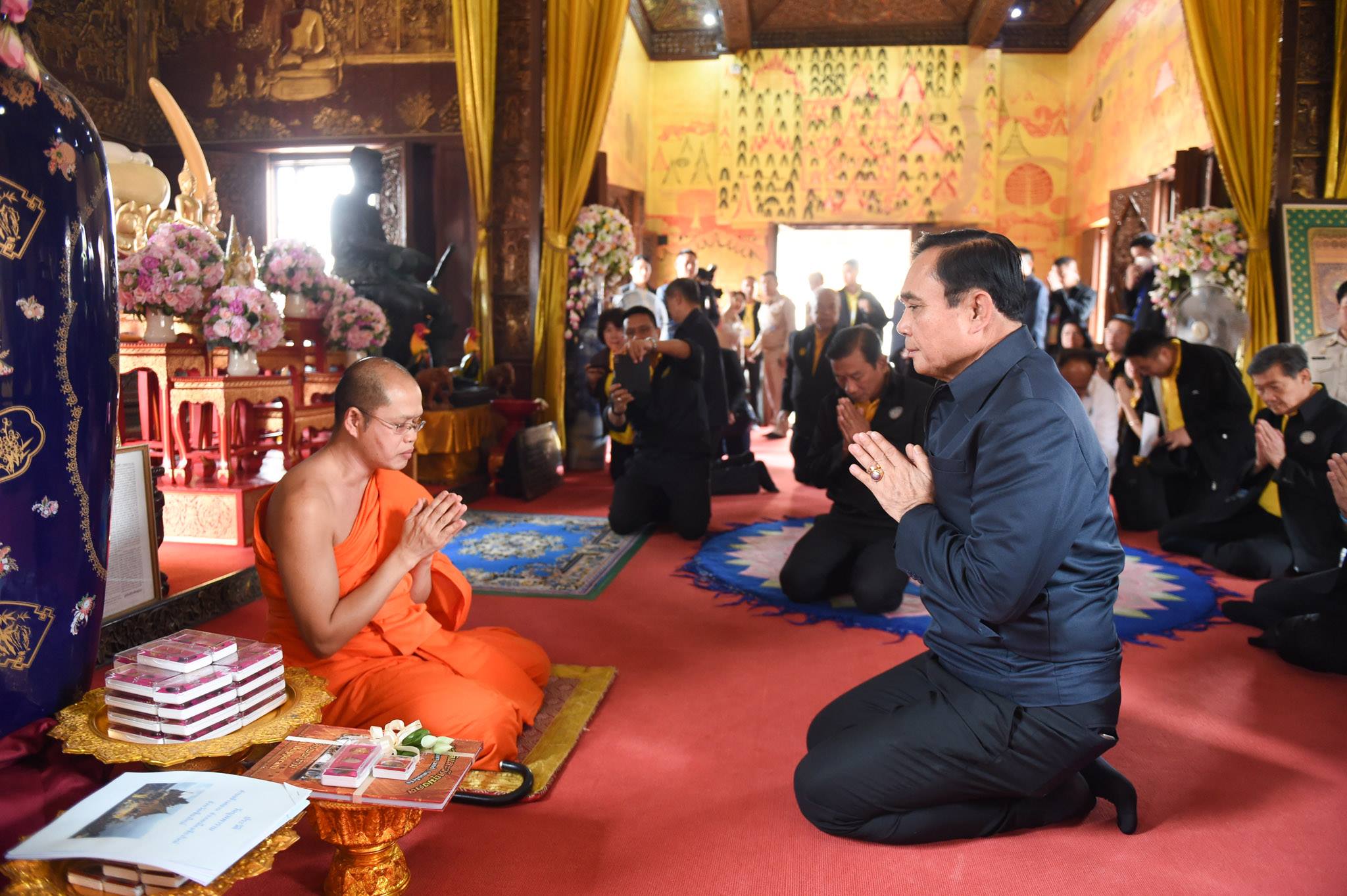
Prayut inspects holy water prepared by monks for King Vajiralongkorn’s coronation. Photo: Prayut Chan-o-cha/ Facebook Page
What then if we consider the prospect of a commander above the sovereign alongside the various incidents that took place in the two months prior to the election—events that could not have been predicted, including the dissolution of Thai Raksa Chart and the announcement of then Democrat Party leader Abhisit Vejjajiva that he would not support Prayut’s bid to be prime minister? These events have made visible the reality that discord over the election is currently emerging among Thailand’s political elite. Over the past five years, for all that it has done, the NCPO has at least failed to install a stable order of power among elites.
Thailand’s first elections in the post-Bhumibol era
On the prospects for a durable authoritarian politics after the 'Bhumibol Consensus'.
When seen from below, Thailand’s political elites appear unified. But I believe that they are currently fragmenting and realigning in new arrangements that have yet to settle. Prayuth’s statement has made me think that the actors involved in the election are not limited to political parties or those individuals who were nominated as prime ministerial candidates. To make sense of the election, we must look to a broader spectrum of both elected and unelected elites—both elites who openly participate in electoral competition and those who do not.
What then if we consider what lies behind the performance of the 2019 election, to consider the deep state as has been proposed by the French academic Eugénie Mérieau? The deep state is likely not a unitary state at all; perhaps once it was but it is not anymore. The present situation resembles instead a confederate deep state of still unsettled networks of power. Several groups are loosely aligning themselves and it remains unclear who is affiliated with who, as well as in what kinds of relationships. But I believe the various miracles and earthquakes which have visibly involved political elites over the past few months were the product of this fragmentation and realignment.
A populist moment
Herein lies the problem: I believe that the Thai cultural constitution has been undergoing extensive change over the past decade of intense political conflict, particularly as it is conceived by the grassroots masses and new generation youth. Political changes, which are constantly deepening and cannot be reined in by elites, are inevitably reflected in the Thai cultural constitution.
If we are to look at relationship of power between the people and the Prayuth–NCPO regime, the change brought about by the elections which will matter most during this transitional period is the emergence of a political populist moment—manifest first and foremost in the successful breakthrough of the Future Forward Party. The conditions which have converged to create a political opportunity structure open to the emergence of a populist political force are:
- The withdrawal from Thai politics and society of two populist leaders—Thaksin and King Bhumibol—during the transition between reigns and due to self-imposed political exile
- The NCPO order and its “five rivers” (the NCPO, the cabinet, the National Legislative Assembly the Constitutional Drafting Committee, the National Reform Steering Assembly), which are beyond scrutiny despite persistent suspicions of corruption and malpractice, and who exercise absolute power without accountability while ignoring the demands and desires of the people
- Feelings among the grassroots classes that the economy is plummeting
- The election, which provided an opportunity for the emergence of a new political populist leader, for whom the election represents an entry-point into the political system
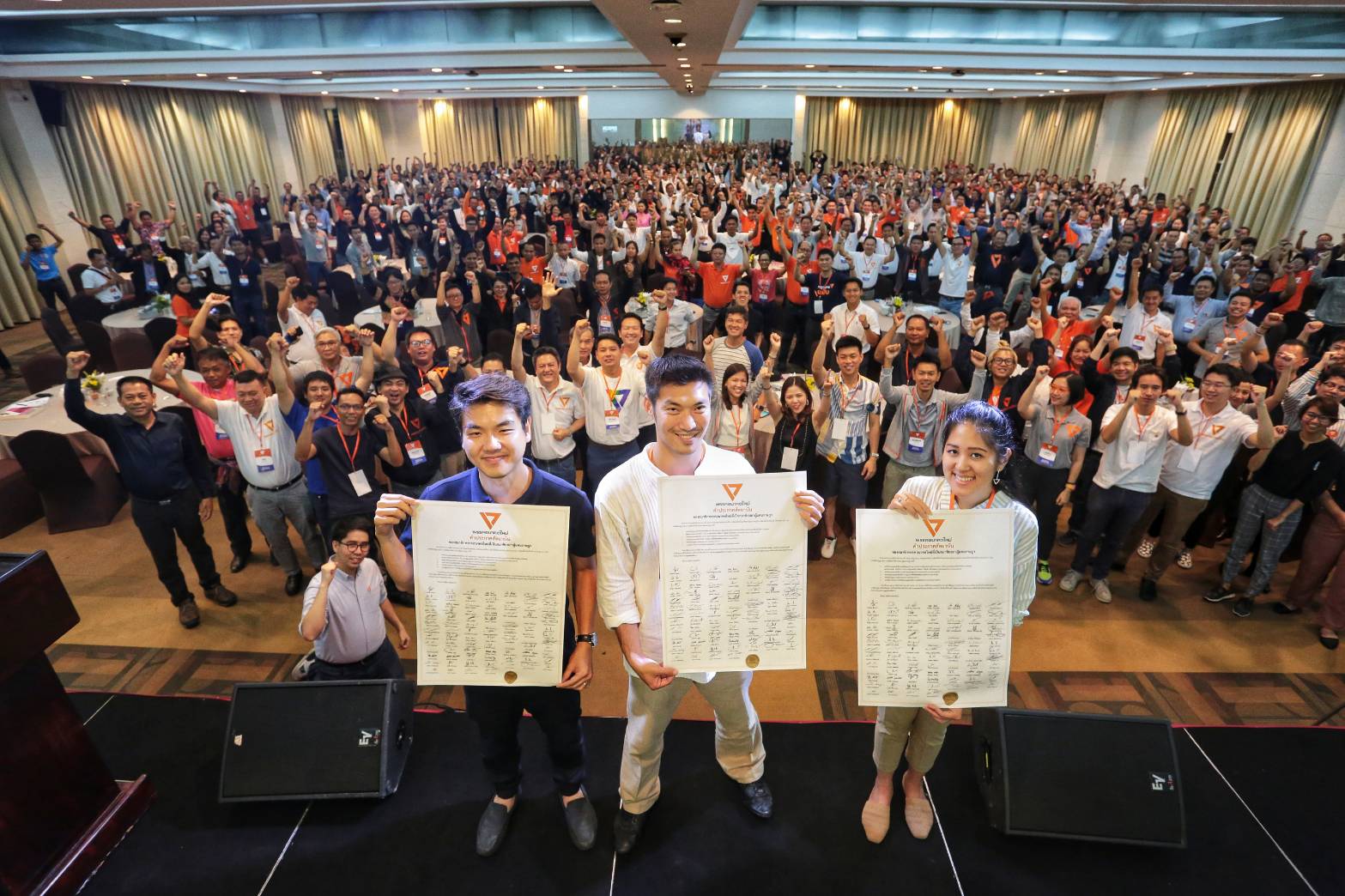
Photo: Future Forward Party/ Public Facebook Page
On one level, Thai politics has throughout history seen the continuous emergence of populist leaders and populist forms of social mobilisation, both in support of elites and in support of resistance. Examples include:
- A populist king during the previous reign
- The student movement from 14 October 1973–6 October 1976, which upheld the slogan, “The people must be sovereigns of the land”, quoted from the poem of Visa Khanthap
- The Assembly of the Poor
- Thaksin Shinawatra
A populist political tradition has been both the political-cultural heritage and legacy of Thai politics since the beginning, albeit dormant in recent years until a contemporary political force remembered, reproduced and drew upon it to campaign and mobilise.
Over the course of not even a year, populist political forces passed through the stages of political party establishment and electoral campaigning, and manifested most effectively in Future Forward. The party’s accomplishments have included:
- Political agenda setting and the expansion of the borders of permissible public political discourse, to the point other political parties were compelled to engage in debate about issues such as opposition to dictatorship, dismantling the legacy of the NCPO, constitutional reform, military reform and partisanship in the justice system
- The rapid rise in popularity, especially among urban and university youth, of the party and some of its leaders, which was effectively converted into electoral strength
- Policy impact that will be visible in the aftermath of the election
In this election, Future Forward appears already to have achieved an electoral breakthrough. The challenge now is one of electoral persistence, or the problem of building a sustainable populist party or social movement, whether in terms of establishing territorial roots and reliable voter bases, converting electoral success to policy direction, or nurturing political cadre and staff to maintain day-to-day operations.
Under the political opportunity structure (the “demand” side of populism) which has ushered in a populist moment, the challenge facing Future Forward (the “supply” side) are:
- Not to merely to present a temporarily or ad hoc popular leader, but a charismatic (in sense of barami) populist leader
- Not to merely be a programmatic electoralist party/personalist electoral vehicle, but to expand into a fully-fledged, mass-based populist party
If Future Forward is able to lay down both broad and deep foundations accordingly, it will be a constructive factor in the ongoing process of transforming Thailand into a democracy.
Post-election predictions
I conclude with some preliminary predictions on Thailand’s post-election political landscape:
- The demands of political populist forces for reform, which were awakened by Future Forward’s campaigning and legitimised in the election results, will soon collide with the constraints placed by the NCPO on the possibilities for democratic change. Those constraints are most exemplified in the structure of power established by the 2017 Constitution (the appointed senate, the 20-year National Strategy, the power of an unelected minority which dominate and are above various independent regulatory institutions), and which is supported by the conservative-authoritarian side.
- If there is resistance and obstructions to the process of initiating political reform, there is serious risk that rising disappointment and disillusionment with the establishment will fuel political conflict until it spills outside of elected political institutions, taking on the characteristics of political movements that are an expression of the rights and liberties of the people under the law.
- An exit out of conflict is the opening and expansion of elected political institutions (parliament, government, parties and so on) as stages for substantive political negotiations, which are responsive to the demands of a public mobilising outside of political institutions. Elected institutions should contribute to the seeking of points of consensus on the building of a new political order, so that transformations take place through the convergence of wills to reform both from the elite above and the grassroots below.
เวลา 22.45 น. ของคืนวันที่ 23 มีนาคม ศกนี้ หรือเพียง 9 ชั่วโมงกว่าก่อนเริ่มการเลือกตั้งสมาชิกสภาผู้แทนราษฎรทั่วไปหลังว่างเว้นมา 8 ปี สำนักพระราชวังได้ออกประกาศทางโทรทัศน์รวมการเฉพาะกิจว่าสมเด็จพระเจ้าอยู่หัวมหาวชิราลงกรณ บดินทรเทพยวรางกูรฯ โปรดเกล้าฯให้เลขาธิการพระราชวังอัญเชิญพระบรมราโชวาทของพระบาทสมเด็จพระปรมินทรมหาภูมิพลอดุลยเดช บรมนาถบพิตรฯ ตั้งแต่ พ.ศ. 2512 หรือกึ่งศตวรรษก่อน ที่คนไทยรู้จักมักคุ้นดีเรื่อง “ส่งเสริมให้คนดีปกครองบ้านเมืองฯ” คำที่ทางราชการเผยแพร่ซ้ำมาอย่างต่อเนื่องนับแต่วิกฤตการเมืองปี พ.ศ. 2535 มาเผยแพร่อีกครั้ง ด้วยเหตุผลที่ว่าสมเด็จพระเจ้าอยู่หัวรัชกาลปัจจุบัน “ทรงมีพระราชประสงค์ให้ประชาชนในชาติ ตลอดจนข้าราชการทุกหมู่เหล่า ทั้งข้าราชการพลเรือน ทหารและตำรวจ…ได้ทบทวนและตระหนักถึงพระบรมราโชวาทที่ได้พระราชทานไว้” น่าสังเกตว่าในเวลาต่อมาของคืนเดียวกันนั้น แฮชแท็ก #โตแล้วเลือกเองได้ ไต่ขึ้นอันดับหนึ่งเทรนด์ในทวิตเตอร์อย่างรวดเร็ว
ความเข้าใจในทางเป็นจริงของประชาชนผู้ใช้สิทธิ์เลือกตั้งว่า “คนดี” เป็นใครค่อยปรากฏชัดขึ้นจากผลการเลือกตั้งขั้นต้นในวันถัดมา ซึ่งสะท้อนว่าพวกเขาเห็นไม่ตรงกัน กล่าวคือ ประชาชนผู้เลือกพรรคการเมืองที่สนับสนุนพลเอกประยุทธ์ จันทร์โอชา หัวหน้า คสช. ให้เป็น “คนดีปกครองบ้านเมือง” ในฐานะนายกรัฐมนตรีต่อไปมีจำนวน 8.32 ล้านคน ขณะที่ประชาชนผู้เลือกพรรคการเมืองที่คัดค้านพลเอกประยุทธ์ จันทร์โอชาในการที่จะเป็น “คนดีปกครองบ้านเมือง” ต่อไปในฐานะนายกฯมีจำนวน 15.49 ล้านคน ส่วนพรรคขนาดกลางและขนาดเล็กที่ยังไม่แสดงจุดยืนเรื่องนี้ชัดเจนอันได้แก่ พรรคภูมิใจไทย, พรรคประชาธิปัตย์ และพรรคชาติไทยพัฒนานั้นได้คะแนนประชาชนรวมกัน 7.94 ล้านคน ทั้งนี้มิไยว่าพลเอกประยุทธ์จะได้รับการโหวตในรัฐสภา (รวมสมาชิกวุฒิสภา 250 คนด้วย) ให้เป็นนายกฯต่อไปหรือไม่
(ทั้งนี้นับผลคะแนนขั้นต้นประมาณ 94% ของคะแนนมหาชน (popular vote) ประกอบกับการประกาศรวมตัวจัดตั้งรัฐบาลของพรรคฝ่ายคัดค้านพลเอกประยุทธ์ จันทร์โอชาและ คสช. เมื่อวันที่ 27 มีนาคม ศกนี้ ตามการคำนวณของบีบีซีไทย ซึ่งระบุรายละเอียดว่า “6 พรรคการเมืองที่ประกาศเป็นพันธมิตรกันแน่นอนแล้ววันนี้ มีคะแนนมหาชน (ป๊อบปูลาร์โหวต) รวมกัน 14.99 ล้านเสียง หากรวม ศม. เข้าไปด้วยจะเป็น 15.49 ล้านเสียง ขณะที่พรรคที่ประกาศตัวสนับสนุน พล.อ. ประยุทธ์ เป็นนายกฯ ต่ออย่างแน่ชัดคือ พปชร. และ รปช. (ไม่นับพรรคประชาชนปฏิรูปที่ไม่มีที่นั่งในสภา) มีคะแนนมหาชนรวมกัน 8.32 ล้านเสียง ส่วนพรรคขนาดกลางและขนาดเล็กที่ยังไม่แสดงจุดยืนชัดเจน ประกอบด้วย พรรคภูมิใจไทย, พรรคประชาธิปัตย์ และพรรคชาติไทยพัฒนา มีคะแนนมหาชนรวมกัน 7.94 ล้านเสียง”)
เราจะเข้าใจการเลือกตั้งและผลการเลือกตั้งครั้งนี้อย่างไร? ผมใคร่เสนอว่าให้ลองเข้าใจมันในบริบทของระเบียบอำนาจของชนชั้นนำและสัมพันธภาพทางอำนาจกับประชาชนของระบอบประยุทธ์@คสช. ซึ่งจะช่วยให้เห็นที่มาและแนวโน้มอนาคตของรัฐบาลหลังเลือกตั้งครั้งนี้โดยภาพรวม
นาฏกรรมโกลาหล
ผมอยากเริ่มจากเรื่องการเลือกตั้งปี 2562 กับการเมืองในหมู่ชนชั้นนำ ประเด็นหลักคือสิ่งที่ผมเรียกว่า “นาฏกรรมโกลาหล” (theatre of chaos) นาฏกรรมแปลว่าละครหรือการแสดงมหรสพ พูดง่าย ๆ คือผมกำลังเสนอว่าการเลือกตั้งครั้งนี้จะกลายเป็นลิเกโกลาหล กล่าวคือมันจะสะท้อนความโกลาหลของการแสดงลิเกการเลือกตั้งที่จัดขึ้นโดยชนชั้นนำ
ในแง่ของความสัมพันธ์ระหว่างการเลือกตั้งกับสัมพันธภาพทางอำนาจในหมู่ประชาชนกับระบอบ ประยุทธ์@คสช. ผมคิดว่าเรื่องสำคัญคือมันจะเป็นจังหวะของประชานิยม (the populist moment) อย่างไรก็ตาม ผมควรชี้แจงให้ชัดเจนแต่ต้นว่าผมไม่ได้ใช้คำว่าประชานิยมนี้ในความหมายทางเศรษฐกิจ ซึ่งหมายถึงการออกนโยบายที่เอื้อเฟื้อต่อประชาชน ให้สวัสดิการ โอนย้ายรายได้ต่างๆ เพื่อเอาใจประชาชน จนถูกหาว่าขาดวินัยทางการคลัง ประชานิยมที่ผมพูดถึงคือประชานิยมทางการเมือง พูดง่าย ๆ คือผมกำลังพูดถึงความเป็นไปได้ของการตื่นตัวทางการเมืองอย่างกว้างขวางของประชาชนที่อาจจะเกิดจากการเลือกตั้งครั้งนี้
และสุดท้ายคือ คาดการณ์แนวโน้มการเมืองหลังการเลือกตั้ง ผมคิดว่าเป็นไปได้ที่ผู้ลงคะแนนเสียงจะประสบกับความผิดหวังยิ่งขึ้น และตาสว่างยิ่งขึ้น (rising disappointment & rising disillusionment) กับระเบียบอำนาจที่ถูกวางไว้ตั้งแต่ก่อนการเลือกตั้ง
ผมคิดเรื่องเหล่านี้บนพื้นฐานของสิ่งที่ผมประเมินว่าเป็น 2 ความล้มเหลวใหญ่ของ คสช. ใน 5 ปีที่ผ่านมา คือความล้มเหลวในการจัดระเบียบอำนาจในหมู่ชนชั้นนำ และความล้มเหลวในการสยบประชาชนให้สงบราบคาบทางการเมือง เพราะพวกเขาทำไม่สำเร็จใน 2 เรื่องใหญ่นี้ใน 5 ปีที่ผ่านมา ภาพของการเลือกตั้งเมื่อเราโยงกับระเบียบอำนาจในหมู่ชนชั้นนำ โยงกับสัมพันธภาพในหมู่ประชาชน จึงได้ออกมาเป็นลิเกโกลาหลกับจังหวะประชานิยม
ผมขอเริ่มจากปัญหาที่ว่าตกลง พล.อ.ประยุทธ์ จันทร์โอชา ผู้ได้รับการเสนอชื่อให้เป็นนายก-รัฐมนตรีของพรรคพลังประชารัฐเป็นอะไรกันแน่? ใช่เป็นเจ้าหน้าที่รัฐ (state official) หรือไม่? อันจะส่งผลถึงสิทธิการรับเสนอชื่อเป็นนายกฯของเขา ผมคิดว่าคำตอบที่ค่อนข้างตรงและชัดเจนที่สุดเท่าที่ได้ยินมาจากสองทางด้วยกันคือ คุณสมชัย ศรีสุทธิยากร อดีตกรรมการการเลือกตั้ง เขาระบุชัดตั้งแต่วันที่ 5 มี.ค. ว่า สถานะของพลเอกประยุทธ์ไม่ใช่เจ้าหน้าที่รัฐ แต่เป็น “เจ้าหน้าที่เหนือรัฐ” (above-the-state official) และหลังจากเรื่องนี้เข้าสู่การพิจารณาของผู้ตรวจการแผ่นดิน (ombudsman) ก็ปรากฏผลไปในทำนองเดียวกัน คือมีมติเอกฉันท์ของคณะผู้ตรวจการแผ่นดินออกมาเมื่อวันที่ 14 มี.ค. ว่า หัวหน้า คสช. ไม่ใช่เจ้าหน้าที่ของรัฐ หากแต่เป็น “รัฏฐาธิปัตย์” (the sovereign) เลยทีเดียวและในฐานะรัฏฐาธิปัตย์ หรือนัยหนึ่งผู้มีอำนาจสูงสุดในระบอบที่ผู้ปกครองมีอำนาจอาญาสิทธิ์(ผ่านมาตรา 44 ของรัฐธรรมนูญ) เสมือนหนึ่ง Leviathan ของ Thomas Hobbes ผู้เข้ายึดและควบคุมอำนาจ (usurpation) ผ่านการปราบดาภิเษก เขาย่อมทรงสิทธิ์เด็ดขาดที่จะกำหนดสภาวะยกเว้น (state of exception) ให้แก่ตนเอง ด้วยการบัญญัติกฎหมายขึ้นใช้เองในสภาพการณ์พิเศษ แทนที่หลักนิติรัฐในสภาพการณ์ปกติ ตามทรรศนะของ Carl Schmitt นักทฤษฎีการเมืองชาวเยอรมัน
การมีรัฏฐาธิปัตย์อยู่เหนือรัฐและรับการเสนอชื่อเป็นนายกรัฐมนตรีของพรรคการเมืองฝ่ายรัฐบาลทหารด้วย จะส่งผลอย่างไรต่อเนื้อแท้ของการเลือกตั้งครั้งนี้? คำตอบปรากฏในบทสนทนาทางโทรทัศน์ระหว่างคุณไพบูลย์ นิติตะวัน หัวหน้าพรรคประชาชนปฏิรูป ซึ่งสนับสนุนพลเอกประยุทธ์ กับ คุณจตุพร พรหมพันธุ์ อดีตผู้นำมวลชนเสื้อแดงและปัจจุบันเป็นฝ่ายค้านรัฐบาล คสช. โดยไพบูลย์ชี้แจงอย่างตรงไป ตรงมาว่า ทางเลือกหลังการเลือกตั้งมีแค่ 2 ทาง กล่าวคือ
- หากในการตั้งนายกฯ มีเสียงสนับสนุนในรัฐสภาไม่พอ พล.อ.ประยุทธ์ ก็ยังเป็นนายกรัฐมนตรีผู้มีอำนาจเต็ม (ไม่ใช่รักษาการ) อยู่ และยังมีอำนาจตามมาตรา 44 ด้วยตามรัฐธรรมนูญฉบับปัจจุบันในบทเฉพาะกาล หรือ
- แต่ถ้าเสียงสนับสนุนในรัฐสภาพอ ก็ตั้ง พล.อ.ประยุทธ์ เป็นนายกฯโดยไม่ต้องมีมาตรา 44
คำพูดของไพบูลย์ทำให้ผมนึกถึง Clifford Geertz นักมนุษยวิทยาชาวอเมริกัน ผู้เสนอในงานเรื่อง Negara: The Theatre State in Nineteenth-Century Bali (ค.ศ. 1980) ว่า รัฐบนเกาะบาหลีสมัยคริสต์ศตวรรษที่สิบเก้ามีลักษณะเป็น “นาฏรัฐ” (theatre state) กล่าวคือเป็นรัฐที่มุ่งผดุงอำนาจผ่านการจัดแสดงมหรสพ ละคร และพิธีกรรม ในความหมายนี้ หากประยุกต์เข้ากับผลการเลือกตั้งครั้งนี้ในทรรศนะคุณไพบูลย์ การเลือกตั้งก็คงเหมือนกับการแสดงละครหรือนาฏกรรมการเลือกตั้งซึ่งตัวนายก-รัฐมนตรีได้ถูกเลือกไว้แล้วตั้งแต่ก่อนมีการเลือกตั้ง
แต่ก็ไม่แน่เช่นกันว่าสภาพการณ์จะต้องเป็นไปอย่างนั้น เพราะดูเหมือนจะมีความไม่ลงตัวบางอย่างอยู่ ดังปรากฏในคำแถลงแปลกแปร่งของ พล.อ.ประยุทธ์ ผู้เป็นรัฏฐาธิปัตย์ ครั้งหนึ่งเมื่อเร็ว ๆ นี้ว่า ขณะนี้เหมือนอยู่ในสนามรบ ทุกอย่างขึ้นอยู่กับผู้บังคับบัญชาจะตัดสินใจว่าจะให้อยู่ต่อ หรือจะถอย หากเห็นว่าไม่คุ้มค่าที่จะเสี่ยง ผู้บังคับบัญชาบัญชาสั่งให้ถอย ตนก็ยินดี
ความน่าสนใจของข้อความดังกล่าวนี้คือผู้พูดเป็นหัวหน้า คสช. เป็นนายกฯ และได้รับการยกย่องให้เป็นรัฏฐาธิปัตย์ คำถามคือ แล้วใครเล่าที่เป็นผู้บังคับบัญชาของรัฏฐาธิปัตย์? หมายถึงอาจารย์นราพร จันทร์โอชา ภรรยาของเขาหรือ? เพราะว่าชายไทยมีประเพณีให้ความเคารพนับถือภรรยา เรามิอาจทราบชัด เพราะผู้พูดก็ไม่ได้ชี้แจงว่าใครเป็นผู้บังคับบัญชาของตน แต่มันก็ทำให้รู้สึกว่านาฏกรรมที่เราเห็นว่าตรียมไว้เรียบร้อยแล้ว อาจจะไม่เรียบร้อยก็ได้ ถ้ารัฏฐาธิปัตย์ยังมีผู้บังคับบัญชา
คำแถลงของพลเอกประยุทธ์ข้างต้นทำให้คิดไปได้ว่าตัวละครในการเลือกตั้งครั้งนี้กว้างกว่าพรรคการเมืองที่เข้าร่วมการเลือกตั้งและผู้ถูกเสนอชื่อเป็นนายกฯ หากรวมชนชั้นนำไทยโดยรวมเข้าไปด้วย ซึ่งมีทั้งชนชั้นนำไทยที่ไม่ได้เข้าสู่การเลือกตั้งและไม่ได้รับการเลือกตั้ง และชนชั้นนำที่เข้าสู่การเลือกตั้งและอาจได้รับเลือกตั้ง (unelected elite & elected elite)
สิ่งเหล่านี้ รวมกับเหตุการณ์เหนือความคาดหมายต่าง ๆในช่วงเดือนสองเดือนที่ผ่านมาก่อนการเลือกตั้ง เช่น การยุบพรรคไทยรักษาชาติ การที่คุณอภิสิทธิ์ เวชชาชีวะ หัวหน้าพรรคประชาธิปัตย์ออกมาประกาศว่าไม่เอาพลเอกประยุทธ์เป็นนายกรัฐมนตรี ทำให้เห็นได้ว่าเอาเข้าจริงแล้วกำลังเกิดความโกลาหลเรื่องการเลือกตั้งในหมู่ชนชั้นนำ และมันสะท้อนว่ เวลา 5 ปีที่ คสช. ทำอะไรต่าง ๆ ไปอย่างน้อยมันไม่ประสบความสำเร็จในการจัดระเบียบอำนาจในหมู่ชนชั้นนำด้วยกัน
การเดินหมากอุบายเล่ห์กลในเกมสัมพันธภาพทางอำนาจในหมู่ชนชั้นนำเป็นอย่างไร? แน่นอนว่า บรรดาชนชั้นนำทั้งหลายเวลาเดินเกมเจรจาต่อรองเพื่อจะจัดสรรปันส่วนแบ่งสรรอำนาจกันนั้น พวกเขาไม่ได้ทำต่อหน้าสาธารณชน ไม่ได้ทำต่อหน้าธารกำนัล มันเกิดขึ้นหลังม่าน เราไม่ค่อยได้เห็น มันจึงไม่ได้ถูกกำกับไว้โดยรัฐธรรมนูญฉบับลายลักษณ์อักษรแม้แต่ฉบับ 2560 ปัจจุบัน ตรงกันข้ามมันถูกกำกับด้วยรัฐธรรมนูญฉบับวัฒนธรรมไทย (the Thai cultural constitution ซึ่งเป็นแนวคิดที่อาจารย์นิธิ เอียวศรีวงศ์ ตั้งขึ้นในบทความตั้งแต่ปี พ.ศ. ๒๕๓๔) เพราะเคยทำกันอย่างนี้ในหมู่ชนชั้นนำ เคยเจรจากันหลังม่านและต่างแดนอย่างนี้ในหมู่ชนชั้นนำ ก็เจรจาต่อรองกันแบบนี้ต่อไป
กล่าวเฉพาะในการมองดูชนชั้นนำไทยโดยรวม ดูเหมือนกลุ่มชนชั้นนำจะมีเอกภาพถ้าเรามองจากเบื้องล่าง แต่ทว่าผมเห็นว่าพวกเขากำลังแตกเป็นเสี่ยง และกำลังจับกลุ่มจับพวกกันใหม่ซึ่งยังไม่ลงตัวเสียทีเดียว (fragmentation & realignment of elite groups)
ดังนั้นถ้าเราคิดถึงลิเกหลังม่าน ว่าเป็นรัฐซ้อนรัฐ หรือรัฐพันลึก (deep state) ตามที่นักวิชาการฝรั่งเศส ดร. ยูเชนี เมริโอ เคยเสนอไว้ รัฐพันลึกของเราก็คงไม่ใช่รัฐเดี่ยว (unitary state) เสียแล้ว มันอาจเคยเป็นรัฐเดี่ยวแต่ตอนนี้ไม่ใช่แล้ว สภาพตอนนี้จะคล้ายกลับสมาพันธรัฐพันลึกของเครือข่ายอำนาจต่าง ๆ ที่ยังไม่ลงตัว (a confederate deep state of still unsettled power networks) และมีหลายกลุ่ม ซึ่งมารวมตัวกันหล่วมๆ และก็ยังไม่แน่ชัดกันว่า ตกลงแล้วใครอยู่กลุ่มไหนกันแน่ แล้วจะให้สัมพันธ์กันอย่างไร ผมคิดว่าปาฏิหาริย์ สึนามิ อะไรต่าง ๆ ในหมู่ชนชั้นนำที่เราเห็นในช่วงไม่กี่เดือนที่ผ่านมาเป็นเพราะลักษณะแบบนี้
ตรงนี้แหละที่เป็นปัญหา เพราะผมคิดว่ารัฐธรรมนูฐฉบับวัฒนธรรมไทยกำลังเปลี่ยนแปลงไปมากในรอบ 10 กว่าปีของความขัดแย้งทางการเมืองอย่างดุเดือดที่ผ่านมา โดยเฉพาะในหมู่มวลชนรากหญ้าและเยาวชนคนรุ่นใหม่ มันเป็นการเปลี่ยนแปลงที่เกิดขึ้นอย่างเป็นไปเองอยู่ทุกเมื่อเชื่อวันและควบคุมไม่ได้ และมันย่อมสะท้อนมาถึงรัฐธรรมนูญฉบับวัฒนธรรมไทยด้วย
การอุบัติขึ้นของประชานิยมทางการเมือง
มองในมุมการเลือกตั้งกับสัมพันธภาพทางอำนาจในหมู่ประชาชนกับระบอบประยุทธ์@คสช. การเปลี่ยนแปลงสำคัญที่สุดในระยะยาวต่อการเมืองไทยช่วงปลี่ยนผ่านที่การเลือกตั้งครั้งนี้นำมา คือการอุบัติขึ้นของจังหวะประชานิยมทางการเมือง (the political populist moment)
เงื่อนไขที่มาบรรจบกันจนเกิดเป็นโครงสร้างโอกาสทางการเมือง (political opportunity structure) ให้แก่การปรากฏตัวขึ้นของพลังประชานิยมทางการเมือง ได้แก่: –
- การหายไปจากสังคมการเมืองไทยของสองผู้นำประชานิยมเดิมในช่วงผลัดแผ่นดินและการลี้ภัยเองทางการเมือง (self-imposed political exile)
- ระเบียบอำนาจแม่น้ำทั้งห้าสายของคสช.ที่ทั้งต้องสงสัยมัวหมองว่าทุจริตฉ้อฉลทว่าอยู่เหนือการตรวจสอบ และใช้อำนาจเด็ดขาดโดยไม่รับฟังเสียง ไม่สนองตอบ และเพิกเฉยต่อความเรียกร้องต้องการของประชาชน
- ความรู้สึกว่าเศรษฐกิจย่ำแย่ลงมากในหมู่คนชั้นรากหญ้า
- การเลือกตั้งที่เปิดโอกาสให้ผู้นำประชานิยมทางการเมืองเกิดขึ้นและน่าจะทะลวงผ่านด่านเลือกตั้งเข้าสู่ระบบการเมืองได้ (electoral breakthrough)
ในแง่หนึ่ง การเมืองแบบเปิดของไทยที่ผ่านมาได้ปรากฏผู้นำและการเคลื่อนไหวทางสังคมแบบประชานิยมขึ้นไม่ขาดสาย ทั้งฝ่ายชนชั้นนำและฝ่ายค้านในอดีต เช่น
- อุปมา populist king ในรัชกาลที่แล้ว
- ขบวนการนักศึกษาประชาชน ๑๔ ตุลาคม ๒๕๑๖ – ๖ ตุลาคม ๒๕๑๙ ซึ่งชูคำขวัญ “ประชาชนต้องเป็นใหญ่ในแผ่นดิน” จากวรรคทองในบทกลอนของคุณวิสา คัญทัพ
- สมัชชาคนจน
- ทักษิณ ชินวัตร เป็นต้น
ในความหมายนี้ ประเพณีการเมืองแบบประชานิยมมีเป็นพื้นเพและมรดกทางการเมืองวัฒนธรรมอยู่ในสังคมการเมืองไทยแต่เดิมแล้ว รอให้คนรุ่นหลังจดจำ ผลิตซ้ำ และหยิบมาใช้รณรงค์เคลื่อนไหว
สัมฤทธิ์ผลที่เห็นได้ชัดของพลังการเมืองแบบประชานิยมที่ผ่านมาระหว่างช่วงการตั้งพรรคการเมืองต่าง ๆ และรณรงค์หาเสียงเลือกตั้ง (ราวไม่ถึงหนึ่งปี) โดยเฉพาะพรรคอนาคตใหม่ได้แก่:
- การปักธงทั้งในแง่ระเบียบวาระประเด็นทางการเมืองและขยายพรมแดนวาทกรรมทางการเมืองที่พูดได้และยอมรับได้ในที่สาธารณะ (agenda setting) จนพรรคฝ่ายอื่น ๆ ต้องหันมาถกเถียงเรื่องนี้บ้าง เช่น ต่อต้านเผด็จการ ลบล้างมรดก คสช. แก้ไขรัฐธรรมนูญ ปฏิรูปกองทัพ ปัญหาความโน้มเอียงทางการเมืองในกระบวนการยุติธรรม เป็นต้น
- ความนิยมที่ทวีขึ้นอย่างรวดเร็วในหมู่ประชาชนโดยเฉพาะเยาวชนเขตเมืองและมหาวิทยาลัยต่าง ๆ ต่อพรรคการเมืองและผู้นำบางรายซึ่งน่าจะแปรเป็นคะแนนเสียงที่เข้มแข็งในการเลือกตั้งได้ (electoral strength)
- ผลกระทบเชิงนโยบาย (policy impact) ซึ่งจะปรากฏชัดขึ้นหลังการเลือกตั้ง
- ปัญหาของผู้นำประชานิยมในการเลือกตั้งครั้งนี้ดูเหมือนจะได้ล่วงเลยเรื่องการทะลุทะลวงฝ่าด่านเลือกตั้ง (electoral breakthrough) ไปแล้ว คำถามถัดไปคือจะธำรงรักษาการยืนหยัดอยู่ในระบบการเมืองอย่างยั่งยืนผ่านการเลือกตั้งหลาย ๆ ครั้ง (electoral persistence) ได้อย่างไร? ซึ่งก็คือปัญหาการสร้างพรรค/ขบวนการทางสังคมแบบประชานิยมนั่นเอง ทั้งในแง่เกาะติดพื้นที่และฐานเสียงแน่ชัดของพรรค, แนวนโยบาย, และผู้ปฏิบัติงาน
ฉะนั้น ภายใต้โครงสร้างโอกาสทางการเมืองที่เปิดออกให้เป็นจังหวะประชานิยม (ด้านอุปสงค์หรือ demand ของประชานิยม) นี้ หากแม้นพลังการเมืองประชานิยมที่ปรากฏขึ้น (ผู้นำ, ขบวนการสังคม, พรรคการเมือง อันเป็นด้านอุปทานหรือ supply ของประชานิยม) สามารถแปรเปลี่ยน วางรากฐานและพัฒนาคืบหน้า กว้างและลึกต่อไปได้ในสังคมการเมืองทั้งในและนอกรัฐสภา กล่าวคือ
- ไม่หยุดแค่เป็นเพียง “ผู้นำกระแสนิยม” ชั่วครู่ชั่วคราว (an ad hoc popular leader) หากพัฒนาไปเป็น “ผู้นำประชานิยมบารมี” (a charismatic populist leader)
- ไม่หยุดแค่เป็นเพียง “พรรคเลือกตั้งเชิงหลักนโยบาย/พาหนะเลือกตั้งส่วนตัวบุคคล” (a programmatic electoralist party/a personalist electoral vehicle) หากขยายตัวเติบใหญ่ไปเป็น “พรรคประชานิยมอิงฐานมวลชน” (a mass-based populist party) เต็มรูปแบบ
ก็จะเป็นปัจจัยเกื้อหนุนทางบวกแก่กระบวนการเปลี่ยนเป็นประชาธิปไตยในระยะปัจจุบันได้
การเมืองหลังการเลือกตั้ง
คำถามคือแล้วฉากทัศน์การเมืองหลังการเลือกตั้งน่าจะเป็นอย่างไร? ผมคิดว่าอาจเป็นเช่นนี้คือ:
- พลังอุปสงค์ประชานิยมทางการเมืองที่ตื่นตัวขึ้นจากการรณรงค์หาเสียงและผลการ เลือกตั้งจะปะทะชนในเวลาอันรวดเร็วกับขอบเขตจำกัดของการปฏิรูปเปลี่ยนแปลงต่อไปในทิศทางประชาธิปไตยจากโครงสร้างอำนาจของรัฐธรรมนูญ คสช. ๒๕๖๐ (วุฒิสภาดังที่เป็นอยู่, แผนยุทธศาสตร์ชาติ ๒๐ ปี, อำนาจเสียงข้างน้อยที่ไม่ได้มา จากการเลือกตั้งซึ่งครอบงำกำกับอยู่เหนือองค์กรอิสระตามรัฐธรรมนูญต่าง ๆ ) ซึ่งมี พลังฝ่ายอนุรักษนิยม-อำนาจนิยมเดิมหนุนหลังอยู่
- หากเกิดการแข็งขืนขัดขวางกระบวนการริเริ่มปฏิรูปการเมืองสืบต่อไป ก็น่าวิตกว่า ความผิดหวังและอาการตาสว่างต่อระเบียบอำนาจเดิมจะเพิ่มสูงขึ้นเรื่อย ๆ (rising disappointment & rising disillusionment with the establishment) ส่งแรงผลักดันความขัดแย้งให้กระฉอกทะลักล้นออกไปนอกกรอบสถาบันการเมืองจากการเลือกตั้ง ในลักษณะการเมืองภาคประชาชนตามสิทธิเสรีภาพที่มีภายใต้กฎหมาย
- ทางออกน่าจะได้แก่การเปิดขยายพื้นที่ความเป็นไปได้ภายในกรอบสถาบันการเมืองจากการเลือกตั้ง (รัฐสภา, รัฐบาล, พรรคการเมือง ฯลฯ) ให้เป็นเวทีเจรจาต่อรองที่ เชื่อมโยงกับพลังประชาชนภายนอก เพื่อรองรับการริเริ่มกระบวนการปฏิรูประเบียบ อำนาจใหม่มากขึ้น นำไปสู่การค่อย ๆ หาจุดบรรจบผสานระหว่างเจตนารมณ์ทั่วไป เพื่อการปฏิรูประเบียบการเมืองใหม่ทั้งจากชนชั้นนำเบื้องบนและประชาชนเบื้องล่าง
 Facebook
Facebook  Twitter
Twitter  Soundcloud
Soundcloud  Youtube
Youtube  Rss
Rss 